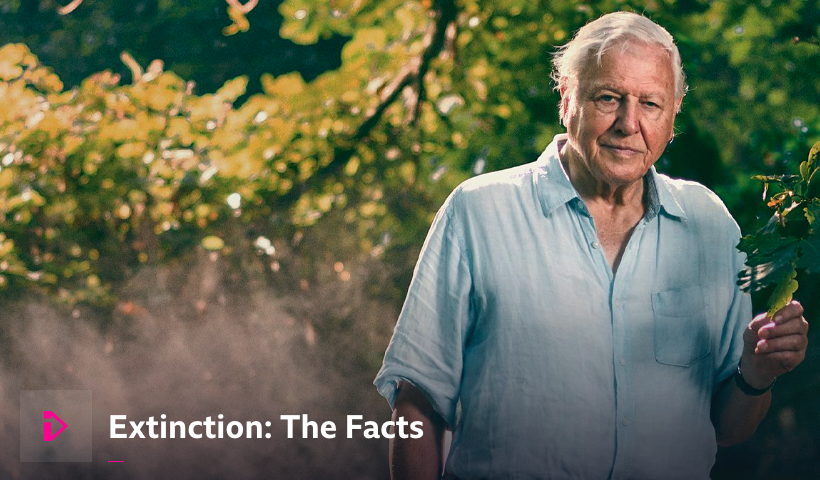It was only a matter of time before Covid-19 got swept up into the wider narrative of humans facing impending doom thanks to our abuse of the planet. But one might have expected better of Sir David Attenborough. His latest BBC documentary, Extinction: The Facts, broadcast on Sunday night might as well have been produced by Extinction Rebellion, so determined was it to present a hysterical picture of apocalypse caused by consumerism and capitalism. Just to ram home the point, one contributor, naturalist Robert Watson, spoke of ‘many in the private sector making a huge profit at the expense of the natural world’, seemingly oblivious to the far greater rape of the environment committed by the former Soviet Union and other socialist countries.
The documentary combined some genuine tragedies, such as the imminent extinction of the northern white rhino, whose population has been reduced to just two: a reproductively-useless mother and daughter, with more dubious claims. A US environmentalist told us that she finds it ‘scary’ that she doesn’t catch so many insects on her windscreen as she used to. If there is genuine evidence on decline of insect populations we should have been presented with it, but this wasn’t it. It should be obvious to anyone that counting dead insects on your windscreen is a pretty poor marker for the health of their populations – for one thing, cars have become more aerodynamic over the years, allowing air to slide over and past them rather than slamming headlong into them, helping to save fuel as well as insects.
But it was the section on Covid-19 which rally made the jaw drop. ‘Scientists have even linked the destructive relationship with nature to the emergence of Covid-19,’ we were told. ‘If we carry on like this we will see more epidemics.’ It went on: ‘We’ve seen an increasing rate of pandemic emergencies. We’ve had swine flu, SARS, ebola. We’ve found that we’re behind every single pandemic. One of the most obvious ways we’re making it more likely that a virus would jump [from animals to humans] is that we’re having lots of contacts with animals – wildlife trade is at unprecedented levels.’
It then tried to present two examples of food production – intensive cattle ranching and wildlife markets in China – as part of the same problem. It is perfectly true that Chinese ‘wet markets’, where many different species are sold and killed alongside each other, have been implicated in SARS and Covid-19, the former involving civets and the latter most likely bats. Breeding poultry and pigs in close proximity has also been suggested as a breeding ground for flu viruses which can then jump to humans.
But these are hardly examples of the mass, intensive agriculture which feeds an increasing proportion of the global population. On the contrary, it is the exact opposite. It is all those old-fashioned farmyards depicted in children’s books which mixed species and brought humans into close contact with animals. Modern livestock farming, by contrast, involves huge monocultures, bred in environments where infectious disease is very tightly-controlled. An outbreak, say, of swine flu is not going to be tolerated for long in a pig farm in a developed country – though it might well be allowed to spread in a developing country where large numbers of people keep pigs in their back yards. The only way in which most of us come into contact with a farm animal now is when a slab of it is presented to us on a plate.
There was one example, however, in Sunday night’s film of a human coming into close contact with an animal: old footage of Sir David himself cuddling up to a mountain gorilla. If the world is overwhelmed by a pandemic which has jumped from the gorilla population into humans we’ll know who might be to blame.
The idea that we face a terrifying future of infectious disease flies in the face of reality. In developed countries infectious disease has gone from being the main cause of death – especially in children – to being a rarity. Globally, the chances of dying from an infectious disease have plummeted in recent decades. According to the Institute for Health Metrics and Evaluation, the proportion of global deaths caused by communicable disease, maternal and neonatal conditions fell from 46 per cent in 1990 to 28 per cent in 2017. Covid-19 will in no way reverse this: so far, it has caused fewer than two per cent of the 56 million deaths which would have been expected this year anyway.
Pandemics, of course, have always been a regular feature of human life. But are novel diseases becoming more commonplace? Well, yes in the sense that we have become better at identifying them – the first virus, after all, was not discovered until 1900, and we have become ever better at isolating and identifying them.
Little over a century ago, we would have had no idea what Covid-19 was – it might possibly have acquired a name, maybe ‘coughing disease’, but we would have had no real idea whether it was novel or not. A study by Brown university in 2014, published in the Journal of the Royal Society, found that there has been a rise in the number of outbreaks of novel infectious diseases since 1980, but also that there has been a decline in the numbers of people being affected by them. We have become much better at identifying diseases, and much better at controlling them. Covid might have inspired an unprecedented global response, but in historical terms it is a pretty gentle pandemic – even now it has a lower death toll than Hong Kong flu, which hardly affected our lives at all.
It is shocking that the BBC can have allowed such one-sided green propaganda onto our screens without putting issues of human development and the natural world into proper context. But then David Attenborough has become a Greta of the Third Age – no-one dares question what he does because he is a ‘national treasure’. Someone at the BBC needs to pluck up the courage.
Got something to add? Join the discussion and comment below.
Get 10 issues for just $10
Subscribe to The Spectator Australia today for the next 10 magazine issues, plus full online access, for just $10.





















Comments
Don't miss out
Join the conversation with other Spectator Australia readers. Subscribe to leave a comment.
SUBSCRIBEAlready a subscriber? Log in